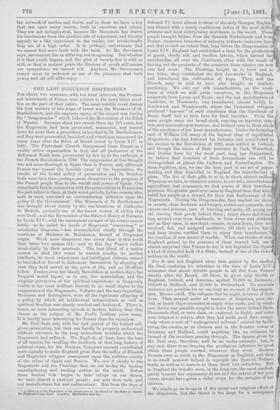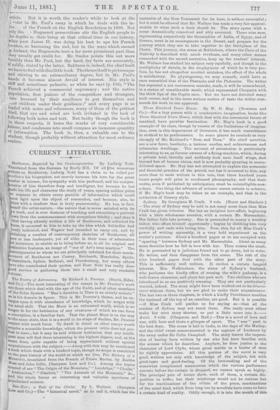THE LAST HUGUENOT DISPERSION.*
Fon about two centuries, with but brief intervals, the Protest- ant inhabitants of France were subject to the most bitter cruel- ties on the part of their rulers. The most notable event during the first century of this reign of terror was the Massacre of St. Bartholomew, and the supreme agony of the second was during the "Dragonnades " which followed the Revocation of the Edict of Nantes. Between these two events there lay 113 years, but the Huguenots had been persecuted, massacred, and hunted down for more than a generation antecedent to St. Bartholomew, and they were persecuted, banished, and sometimes massacred for many years after the Edict of Recall issued by Louis XIV. in 1685. The Protestant Church disappeared from France as a visibly active organisation in fact; and all professors of the Reformed Faith were prosecuted by law up to the outbreak of the French Revolution in 1789. The suppression of free thought was not more thorough in Spain than in France, and, although France was spared the horrible curse of the Inquisition, the results of the brutal policy of persecution and its Bourbon tools wore for a time, perhaps, more disastrous to the progress of the French people than to the wealth and power of Spain. One remarkable fact in connection with the persecutions in Franc,e was the part taken in them, at their worst periods, by two women, who, each in tarn, exercised an overmastering influence upon the policy of the Government. The Massacre of St. Bartholomew was brought about chiefly by the machinations of Catherine de Medicis, probably one of the basest women of ability that ever lived ; and the Revocation of the Edict of Henry of Navarre, by Louis XIV., with the consequent ravages of his mistionnairee bones,—as he called his herds of Huguenot " converting " or murdering dragoons,—was accomplished chiefly through the exertions of Madame de Maintenon, herself of Huguenot origin. Work more disastrous was never done in this world than those two women did,—and to this day France suffers incalculably by their misdeeds. The best blood of a nation cannot be shed like water in wanton cruelty, its noblest intellects, its most industrious and intelligent citizens, cannot be banished or forced to dishonour themselves by abjuring all that they hold sacred as the price of life, and no ill-effects follow. France owes her bloody Revolution in modern days, her frequent moral lapses, so to say, her materialism, and the singular perversion of her spiritual aspirations so frequently visible in her most brilliant literati, in no small degree to the suppression of the Huguenots. Voltaire and the encyclopaedists, Rousseau and Robespierre, were all the legitimate offspring of a policy by which all intellectual independence as well as spiritual freedom was sternly crushed and destroyed. There is, hence, no more interesting episode in modern history than that chosen as the subject of Mr. Pool's Lothian prize essay. It is hardly more interesting for France than for ourselves.
Mr. Pool deals only with the last period of the hottest reli- gious persecution, but that can hardly be properly understood without reference to the long antecedent troubles which the Huguenots had suffered. We English, at least, have the best of all reasons for recalling the incidents of that long history of political crime, for the Norman Conquest scarcely contributed more signally to make England great than the influx of Flemish and Huguenot refugees consequent upon the ruthless cruelty of the rulers of Spain and France. We owe it chiefly to the Huguenots and the Flemings that we are to-day the leading manufacturing and trading nation in the world. Before these hunted folk began to take refuge on our shores, we were almost a pastoral people ; our arts were rude, and our manufactures few and rudimentary. But from the days of
* A llistopy of the Iloguonote of the Dieperaton at the Recall of the Edict of Nantes. By Reginald Lone Pool. London Macmillan and 00,
Edward VI. down almost to those of the early Georges, Englar4 was blessed with a nearly continuous influx of the most ekilfu 1 artisans and most enterprising merchants in the world. Thee people brought hither, from the Spanish Netherlands and fro France, numerous branches of industry hitherto unknown here and that to such an extent that, long before the Dragonnades o Louis XIV., England had established a fame for the production of goods, chiefly silk and woollen fabrics, which carried her merchandise all over the Continent, often with the result of driving out the products of the countries from whence our new arts had come. The Flemings taught us to brew and to tan hides, they established the first dye-works in England, and introduced the cultivation of hops. They, and the French, may be said to have also taught us market- gardening. We owe our silk manufactures, on the excel- lenco
of which we still pride ourselves, to the Huguenot emigrants from Lyons and Tours ; and the hat manufacture of " Caudebec, in Normandy, was transferred almost bodily to Southwark and Wandsworth, where the Protestant refugees produced " beavers " of such excellence that the Cardinals of Rome itself bad to turn here for their berates. From the same people came our broad-cloth, weaving on tapestry, cam- bric, and lace-making industries ; and Ireland owes to them much of the excellence of her linen manufactures. Under the fostering A care of William III. many of the highest class of expatriated Huguenots, who had followed his fortunes and contributed to his success in the Revolution of 1688, were settled in Ireland, and though the traces of their presence in Cork, Waterford, and Dublin have for the most part long ago disappeared, we believe that numbers of their descendants can still be distinguished at places like Lisburn and Portarlington. To these fugitives, also, we owe the best part of our art of paper- making, and they domiciled in England the manufacture o glees. The list of their gifts to us is, in short, almost endles Wherever we turn, to whatever science, to our arts, manufacture agriculture, and commerce, we find traces of their benefice presence. No greater good ever came to England than that whit befell her people as a reward for their free harbourage of t Huguenots. During the Dragonnades, they reached our shor in crowds, often destitute and hungry, nobles and peasants, me chants and artisans, men of learning and piety, all, young an old, leaving their goods behind them ; many alone and frien less, severed even from husbands, or from wives and children and as they came, in merchant vessels, in open boats, they we received, fed, and assigned residence, till their active han and busy brains enabled them to repay their benefactors b the creation of new means of wealth. When one thinks of wha England gained by the presence of these hunted folk, one almost surprised that France to-day is not degraded like Spai a kind of stranded hulk of a State, instead of one of the riche nations in the world.
For it was not England alone that gained by the credo Mr. Pool, confining his attention to the time of Louis XIV. estimates that about 400,000 people in all fled from France shortly after the Recall. Of these, he gives only 80,000 to England, Ireland, and America, against 75,000 to Germany, 100,000 to Holland, and 25,000 to Switzerland. No accurate statistics are possible, for no one kept an account of the emigra- tion. No one could, The refugees fled by night, in terror of their. lives. They escaped under all manner of disguises, were car- ried on board ships concealed in empty wine-casks, and by what- ever device was possible sought to leave the terror behind them. Thousands died, or were slain, or captured in flight ; and some were tempted to return, after they had made good their escape. Only where a sort of "underground railroad" existed for facili- tating the exodus, as at Geneva and in the frontier towns of Germany and Holland, could anything like an estimate be formed of the numbers passing through. The figures given by Mr. Pool may, therefore, well be an under-estimate ; but, in any case, there is no denying the prodigious influence for good which these people exerted, wherever they went. Modern Prussia owes as much to the Huguenots as England, and they in no small measure helped to repeoplo the Spanish Nether- lands, as well as to restore to them their lost industries. But to England the benefits were, in the long-run, the most marked, partly because her supremacy at sea and the extent of her pro- vinces abroad have given a wider scope for the energies of her citizens.
We might go on to speak of the moral and religious effect of the dispersion, but the theme is too large for a newspaper ' Iticle. But it is worth the reader's while to look at the 4
f' f, ^riter in Mr. Pool's essay in which he deals with the in- j 1.1e. - of the French on the English Revolution in 1688. Not li.my dia , • 1 Huguenot persecutions stir the English people to he depths (:4 their being at that critical time in our history, when poor James II. was doing his best to ape his French brother, so hastening the end, but in the wars which ensued (- In Ireland, the Huguenots bore a far more prominent part than . hey usually get credit for. Mr. Smiles points this out more ',forcibly than Mr. Pool, but the hard, dry facts are accurately, If coldly, stated by the latter. Baldness is, indeed, the chief fault we have to find with this little book. The theme itself is picturesque and stirring to an extraordinary degree, but in Mr. Pool's hands it becomes almost devoid of interest. His style is
.,, stiff and sometimes pedantic, as when he says (p. 156), "The l French achieved a commercial supremacy ; and the native
/ j Population, first jealous of the competitors and strangers, vere lessened by their excellence to put themselves and –.0ir children under their guidance ;" and every page is so loaded with notes and references, many of them of the pettiest ,kind, that eye and mind are both irritated in the task of Following both notes and text. But faulty though the book is In these respects, it bears the marks of very considerable 4abour, and condenses into small compass an immense quantity :of information. The book is, then, a valuable one to the i student, though probably without attraction for most ordinary
1/ readers.





























 Previous page
Previous page